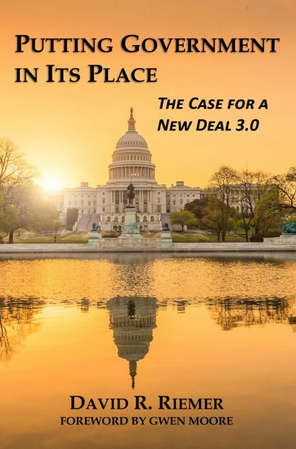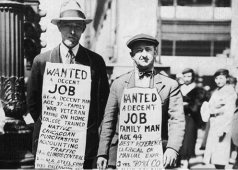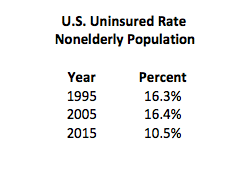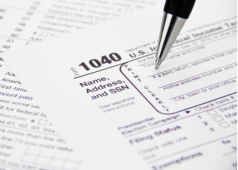Where Government Fails
Offsetting its achievements, American government has failed badly in many areas.
Despite the general success of government in the U.S., and despite the special contribution of the New Deal in uplifting the living standards of the people and the economy of the country, Americans are far from satisfied with the condition of our society and economy.
They have every reason to be displeased.
There is far too much unemployment and poverty. There is no good reason why tens of millions of Americans remain uninsured even after Obamacare. Nor should tens of millions of children drop out of school, or fail in reading and and basic math. Stark racial disparities in employment, income, health and education, as well widespread racial injustice that contributes to the mass incarceration of young black men, continue from decade to decade. Gaping inequalities in income and wealth remain and widen. It is inexcusable that our roads and bridges should be deteriorating. Nor should our taxes be so unfair, complex, and high. Nor should Congress, at the bidding of special interests and powerful lobbyists, twist the economy so that it wrests economic control from the American people and favors the politically influential.
These problems are not accidents. They have a cause. Government could solve them. But government has failed to act, or acted unwisely.
American government has not yet found its proper place in our society or economy. We—citizens, voters, and policymakers—have failed to redesign our government so that it achieves its full potential in promoting “life, liberty, and the pursuit of happiness.”
The New Deal in particular did not get everything right. Much of what the New Deal writ large achieved makes sense. The baby should not be thrown out with the bathwater. But there’s a lot of bathwater. The New Deal fell short in many areas, both in what it left undone and in what it did wrong.
American government suffers from six major shortcomings:
First: An Inadequate System of Economic Security and Equal Opportunity: Government has failed to:
- Ensure that the unemployed have easy access to wage-paying jobs;
- Drive down poverty to a residual level by creating an adequate system of minimum wages, earning supplements, and (for those outside the labor market) disability and retirement benefits; and
- Fix our flawed health insurance system and deficient education system.
Second: Perverse, "Poverty-Requiring" Welfare Programs: Instead of creating a truly comprehensive system of economic security, government has partially filled some of the gaping holes with a complex, piecemeal, "poverty-requiring" patchwork of welfare programs that punish work and marriage.
Third: Insufficient Protection From Major Market Risks: Government has failed to enact sufficiently strong regulations to safeguard the environment, workers, consumers, and investors from harm and undue risk.
Fourth: Subsidies That Distort and Weaken the Market: Rather than let individual American consumers and investors determine the shape and direction of the economy, government has injected massive subsidies into the American market, distorting its operation and undermining its productivity.
Fifth: Improper Financing of Infrastructure Repair: Government has failed to repair the nation's outdated and deteriorating infrastructure, falling behind on road maintenance and mistakenly relying on taxes rather than user fees to pay the growing bill.
Sixth: A Dismal Tax System: To finance the costs of American government where user fees are not possible, government has set up a tax system that is grossly unfair, mind-boggling in its complexity, and excessive in the total amount of taxes collected.
The good news is that all six major failures of American government can be fixed. The pages that follow explain each failure in detail, and spell out specific policies to correct them.



